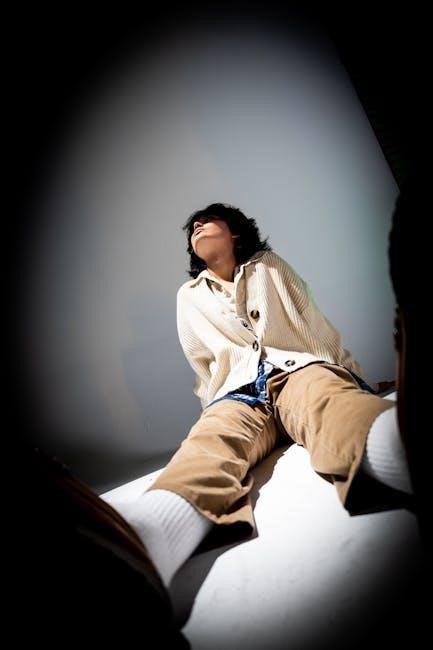
Babel by R.F. Kuang is a historical fantasy novel exploring themes of translation, power, and colonialism. Set in a reimagined Oxford University, the story follows Robin Swift, a brilliant yet troubled scholar, as he uncovers the dark secrets of the Royal Institute of Translation, known as Babel. The novel intricately weaves magic, language, and history, offering a thought-provoking critique of imperialism and academic exploitation. Kuang’s vivid world-building and lyrical prose have captivated readers, making Babel a standout in modern fantasy literature.
1.1 Overview of the Novel
Babel is a historical fantasy novel that delves into the intersection of language, magic, and power. Set in an alternate 19th-century Oxford, it follows Robin Swift, a young orphan recruited by the enigmatic Royal Institute of Translation; The story unfolds as Robin discovers the institute’s secrets, including the magical system tied to Silver bars and the ethics of translation. Kuang’s meticulous research and academic background shine through, blending historical accuracy with fantastical elements.
1.2 Historical and Fantasy Elements
Kuang seamlessly combines historical and fantasy elements, creating a richly detailed world. The novel draws inspiration from mid-19th-century Britain, incorporating real historical events and figures while introducing magical concepts like Silver bars and analytic magick. The result is a unique blend of fantasy and realism, offering readers a fresh perspective on colonialism, language, and power dynamics.

1.3 Reception and Popularity
Babel has garnered widespread critical acclaim for its nuanced storytelling and thematic depth. Readers and critics alike praise Kuang’s ability to balance fantasy with historical accuracy, making the novel a favorite among fans of thought-provoking fiction. Its popularity has also led to discussions about its adaptation potential, with many eagerly anticipating its transition to the screen.
Babel by R.F; Kuang is a historical fantasy novel set in an alternate version of 19th-century Oxford. The story follows Robin Swift, a young orphan recruited by the Royal Institute of Translation, where scholars harness the power of language to create magic. As Robin delves deeper into the institute’s secrets, he uncovers the dark underpinnings of its power, tied to colonial exploitation and the commodification of language. The novel explores themes of identity, power, and the ethics of translation, blending historical accuracy with a richly imagined magical system.
Babel seamlessly merges historical and fantastical elements, set in an alternate version of mid-19th-century Britain. The novel reimagines Oxford University as a hub of magical learning, where scholars at the Royal Institute of Translation wield language to create powerful magic. Historical events and figures are intertwined with fictional elements, such as Silver bars—magical tools tied to colonial exploitation. Kuang’s world-building critiques colonialism and the commodification of language, blending real-world history with a richly imagined magical system to explore themes of power, identity, and ethics.
Babel has garnered significant attention and acclaim since its release. Critics praise its intricate world-building and sharp commentary on colonialism and power. Readers appreciate its unique blend of historical fiction and fantasy, resonating with those interested in linguistic and cultural themes. The novel has achieved commercial success, debuting on the New York Times bestseller list. Its popularity extends to online communities, with discussions flourishing on platforms like BookTok. Despite some controversy, Babel remains a standout in modern fantasy, sparking important conversations about identity and ethics.
Literary Context and Themes
Babel explores colonialism, linguistic power, and identity, blending historical and fantastical elements to examine how language shapes culture and control, resonating deeply with contemporary issues.
2.1 The Role of Translation in Society
In Babel, translation is depicted as both a bridge and a barrier, reflecting its dual role in society. It facilitates communication but also perpetuates inequality when misused for power. Kuang explores how translation can erase cultures and reinforce colonial hierarchies, particularly in 19th-century Britain. The novel highlights the exploitation of languages for imperial gain, mirroring historical realities. Through Robin Swift’s journey, the story underscores the ethical dilemmas of translating cultures and the delicate balance between preservation and appropriation, raising questions about language’s role in shaping identity and control.
2.2 Power Dynamics and Colonialism
Babel critically examines the intersection of power and colonialism, reflecting 19th-century Britain’s imperial dominance. The story portrays the Royal Institute of Translation, or “Babel,” as a tool of colonial control, where language is weaponized to maintain power over colonized societies. Kuang explores how colonialism exploits cultural knowledge, erasing indigenous identities while enriching the empire. The novel highlights the moral complexities faced by characters like Robin Swift, who grapple with complicity in systems of oppression. Through this lens, Babel critiques the historical legacy of imperialism and its enduring impact on marginalized cultures.
2.3 The Intersection of Magic and Language
Babel explores the profound link between magic and language, where words are the source of power. In Kuang’s world, magicians harness this power through “Silvered Tongues,” enchanted silver bars inscribed with words that manifest magic. The novel delves into how language shapes reality, with Oxford’s magical academia relying on linguistic mastery. This system reflects the idea that language is not just a tool but a weapon, capable of creating or destroying. Kuang’s depiction highlights the magic inherent in words and their role in shaping power structures, blending fantasy with linguistic philosophy.
Key Plot Points and Characters
Robin Swift, an orphan from Canton, is recruited into Oxford’s Royal Institute of Translation, or “Babel,” where students master magical translation to maintain British empire’s power through language.
3.1 Robin Swift: The Protagonist’s Journey
Robin Swift, a Cantonese orphan, is thrust into the prestigious Royal Institute of Translation, where he grapples with identity and morality. His journey explores themes of belonging, power, and sacrifice, as he navigates the magical world of Babel while confronting the darker truths of colonialism and linguistic exploitation. Robin’s growth from an outsider to a pivotal figure in the Institute highlights the tension between loyalty and rebellion, making him a compelling and deeply human protagonist in R.F. Kuang’s narrative.
3.2 The Magical System of “Babel”
The magical system in “Babel” revolves around translation and language, with power derived from the manipulation of words. The Royal Institute of Translation harnesses this magic using silver bars inscribed with words from various languages, creating a fantastical yet logical framework. This system highlights the cultural and linguistic hierarchies, as certain languages hold greater magical potency. The magic is both a tool of creation and destruction, reflecting the ethical dilemmas of its use and the cost it exacts on those who wield it.
3.3 The Significance of the Tower of Babel
The Tower of Babel in R.F. Kuang’s “Babel” serves as a metaphor for the dangers of unchecked power and the consequences of linguistic division. Rooted in biblical lore, the tower symbolizes humanity’s hubris and the fragmentation of languages. In the novel, it represents the Royal Institute’s ambition to control knowledge and culture, mirroring colonialist ideologies. The tower’s presence underscores themes of exploitation and the erasure of marginalized voices, acting as a cautionary tale about the ethical costs of empire-building and the commodification of language.

Historical Fantasy and World-Building
R.F. Kuang blends historical Oxford with fantasy, creating a richly imagined world where magic and colonialism intersect. The Royal Institute of Translation, or “Babel,” becomes a hub of power, exploring the exploitation of cultures through language and silver bars.
4.1 Mid-19th Century Britain as a Setting
R.F. Kuang’s Babel is set against the backdrop of mid-19th century Britain, a time of colonial expansion and industrial progress. The novel vividly portrays Oxford University, blending historical accuracy with fantastical elements. The Royal Institute of Translation, known as “Babel,” serves as a central hub of power, where language and magic intersect. Kuang’s depiction of this era critiques colonialism and cultural exploitation, using the setting to explore themes of identity, power, and the commodification of knowledge. The historical context adds depth to the story, grounding its fantastical elements in a familiar yet reimagined world.
4.2 The Creation of a Fantastical Oxford University
In Babel, R.F. Kuang reimagines Oxford University as a hub of magical and academic excellence. The Royal Institute of Translation, or “Babel,” is a secretive, prestigious institution where students master language and magic. Kuang’s Oxford blends historical architecture with fantastical elements, such as enchanted silver bars and hidden libraries. The university’s rigid hierarchy and competitive atmosphere mirror real-world academic pressures, while its magical system critiques the exploitation of knowledge for power. This fantastical Oxford serves as both a setting and a metaphor for the tensions between tradition and innovation.
4.3 The Impact of Slavery and Commodification
In Babel, R.F. Kuang explores the dark underpinnings of power through the commodification of human suffering. The magical system relies on “silver bars,” forged from the pain of enslaved and marginalized individuals. This practice mirrors historical atrocities, such as the transatlantic slave trade, highlighting the exploitation inherent in colonialism. The novel critiques how societies justify oppression for material gain, perpetuating cycles of violence and inequality. This thematic thread underscores the ethical costs of unchecked power and the dehumanizing effects of treating people as commodities.

R.F. Kuang’s Writing Style
R.F. Kuang’s writing in Babel is marked by dense world-building, moral ambiguity, and a sharp critique of power. Her prose blends fantasy with historical depth, creating a unique narrative voice that challenges readers to confront uncomfortable truths about colonialism and exploitation.
5.1 Use of Analytic Magick
R.F. Kuang’s Babel introduces Analytic Magick, a system rooted in linguistic deconstruction and translation. This magick relies on the extraction of meaning from languages, reflecting the novel’s exploration of power and cultural erasure. The concept of silver-working—transforming words into tangible magic—highlights the commodification of language, tying into themes of colonial exploitation and academic elitism. Kuang’s meticulous world-building ensures that Analytic Magick feels both fantastical and grounded, offering a unique lens to critique historical and modern power structures.
5.2 The Paradox Party and Research Methods
The Paradox Party in Babel represents a radical faction within the Royal Institute of Translation, challenging the ethical boundaries of silver-working and linguistic magic. Their unconventional research methods often blur the lines between innovation and moral decay. Kuang depicts their experiments as both brilliant and dangerous, reflecting the tension between academic pursuit and ethical responsibility. The Party’s actions underscore the novel’s critique of power and knowledge, questioning whether the pursuit of progress justifies its costs.
5.3 Balancing Fantasy and Historical Accuracy
R.F. Kuang skillfully blends fantasy with historical accuracy in Babel, creating a compelling narrative that respects both the magical and the real. By grounding the story in mid-19th century Britain, Kuang ensures the fantastical elements of the Royal Institute of Translation feel plausible within a recognizable historical context. This balance enhances the novel’s themes of colonialism and power, offering readers a rich, immersive world that feels both familiar and extraordinary. Kuang’s meticulous research and imaginative storytelling make this blend seamless and engaging.

Social and Political Commentary
R.F. Kuang’s Babel delivers sharp commentary on colonialism, racism, and power imbalances, using historical fantasy to critique systemic oppression and the exploitation of marginalized cultures.
6.1 Critique of Imperialism and Racism
R.F. Kuang’s Babel sharply critiques imperialism and racism through its depiction of 19th-century Britain’s exploitation of colonized cultures. The novel examines how imperial powers commodify and erase indigenous languages and traditions, using the magical system of “Silver Working” as a metaphor for cultural extraction. The protagonist, Robin Swift, grapples with the moral cost of this system, reflecting the broader ethical dilemmas of colonialism. Kuang’s portrayal of Oxford’s Institute of Translation as a tool of imperial control highlights the intersection of knowledge, power, and oppression, offering a scathing commentary on historical and ongoing injustices.
6.2 The Exploitation of Marginalized Groups
In Babel, R.F. Kuang critiques the systemic exploitation of marginalized groups, particularly through the Institute of Translation’s reliance on their labor and cultures. The novel highlights how these groups are commodified, their languages and traditions extracted for power. Robin Swift’s journey underscores the moral toll of this exploitation, as he navigates the Institute’s role in erasing cultural identities. Kuang’s portrayal exposes the intersection of colonialism and systemic oppression, emphasizing the human cost of imperial ambition and the resilience of marginalized voices in the face of erasure.
6.3 The Ethics of Knowledge and Power
Babel scrutinizes the ethical dilemmas surrounding knowledge and power, particularly through the silver bars that fuel the Institute of Translation. These bars, forged from human suffering, symbolize the moral cost of imperial dominance. Robin Swift’s journey reveals the tension between intellectual pursuit and ethical responsibility, questioning whether knowledge justifies exploitation. Kuang challenges readers to consider the consequences of concentrating power in institutions that prioritize dominance over equity, reflecting on the enduring impact of such systems on marginalized cultures and identities.
Adaptations and Media
Babel has been optioned for TV adaptation by Amazon MGM Studios, with plans to bring its intricate world-building and complex themes to life on screen.

7.1 TV Series Adaptation by Amazon MGM Studios
Amazon MGM Studios has officially optioned Babel for a TV series adaptation, promising to bring its rich, immersive world to life. The project is set to explore the novel’s blend of historical fiction, fantasy, and linguistic magic, appealing to fans of complex, thought-provoking storytelling. With renowned creators like Angela Kang, known for The Walking Dead, attached, the series is expected to capture the book’s depth and nuance. While casting and release details remain under wraps, anticipation is high among readers and critics alike.
7.2 The Involvement of The Walking Dead Showrunner
Angela Kang, renowned for her work on The Walking Dead, is set to helm the Babel TV series adaptation. Her expertise in blending action, drama, and complex characters aligns perfectly with the novel’s themes of power, identity, and morality. Kang’s involvement has sparked excitement among fans, as her track record suggests a faithful yet innovative adaptation. Her collaboration with R.F. Kuang ensures the series will stay true to the book’s essence while exploring its deeper emotional and social layers for a broad audience.
7.3 The Potential for Visual Storytelling
The adaptation of Babel into a visual medium offers immense potential for storytelling. The novel’s magical system, based on translation and language, lends itself to stunning visuals, such as glowing silver threads and the grandeur of the Tower of Babel. The intricate world-building, including the fantastical Oxford University, provides a rich canvas for production design. The series can bring to life the emotional depth of Robin Swift’s journey and the moral complexities of colonialism, creating a visually immersive experience that enhances the narrative’s impact.
Awards and Recognition
“Babel” by R.F. Kuang was a 2022 Goodreads Choice Awards finalist, showcasing its impact. The novel received critical acclaim for its unique blend of historical fantasy and linguistic magic, further solidifying its place in modern literature.
8.1 Exclusion from the Hugo Awards
Despite its critical acclaim, “Babel” faced controversy when it was excluded from the 2023 Hugo Awards due to eligibility issues. The novel’s publication date and category placement sparked debates among fans and award committees. This exclusion, while disappointing to many, highlighted the complexities of award systems and the challenges of categorizing innovative works like Kuang’s, which blends historical fiction, fantasy, and linguistic themes. The situation underscored the need for clearer guidelines in recognizing diverse literary achievements.
8.2 Controversy and Reader Reactions
“Babel” sparked significant controversy due to its exploration of colonialism, racism, and exploitation, which resonated deeply with readers. While some praised its bold critique of historical injustices, others found certain scenes or themes uncomfortable or triggering. The novel’s unflinching portrayal of power imbalances and ethical dilemmas divided opinions, with debates emerging online about its handling of sensitive topics. Despite this, the book’s ability to provoke thought and spark conversations solidified its impact, reflecting its relevance to contemporary societal issues.
8.3 The Novel’s Critical Acclaim
“Babel” received widespread critical acclaim for its innovative storytelling and depth. Critics praised its intricate world-building, blending historical and fantasy elements seamlessly. The novel’s exploration of language, power, and colonialism was lauded as thought-provoking and intellectually stimulating. R.F. Kuang’s writing style, particularly her use of analytical magick, was highlighted as a standout feature. The book’s originality and unflinching examination of societal issues solidified its place as a groundbreaking work in the fantasy genre, earning it a reputation as a must-read for fans of intellectual and immersive storytelling.

R.F. Kuang’s Background and Other Works
R.F. Kuang is a fantasy author known for her immersive storytelling and academic background. She gained acclaim with The Poppy War Trilogy, exploring themes of war, identity, and power. Her work often blends historical and fantastical elements, reflecting her studies in Chinese history and folklore. Kuang’s writing is deeply influenced by her experiences as a scholar and her passion for reimagining historical narratives through a speculative lens. Her unique voice has solidified her place in modern fantasy literature.
9.1 The Poppy War Trilogy
R.F. Kuang’s The Poppy War Trilogy is a groundbreaking fantasy series that reimagines Chinese history and mythology. The trilogy includes The Poppy War, The Dragon Republic, and Burning God, following protagonist Rin, a young orphan who enrolls in a prestigious military academy. The series explores themes of war, colonialism, and identity, blending historical and fantastical elements. Its vivid world-building and emotional depth have garnered widespread acclaim, establishing Kuang as a major voice in fantasy literature. The trilogy has been praised for its raw portrayal of violence and power, resonating with readers globally.
9.2 The Author’s Academic and Writing Journey
R.F. Kuang’s academic background lays the foundation for her writing. She studied Chinese History at Georgetown University, which deeply influenced her storytelling. Her debut novel, The Poppy War, emerged from her thesis and quickly gained acclaim. Kuang’s writing often blends historical research with fantastical elements, reflecting her academic rigor. Her studies in folklore and mythology also shaped her unique narrative style. This blend of scholarship and creativity defines her approach to crafting immersive worlds and compelling characters, as seen in Babel.
9.3 The Inspiration Behind Babel
R.F. Kuang drew inspiration for Babel from 19th-century historical events, including the Opium Wars and the Enlightenment’s dark side. Her studies in Chinese history and folklore influenced the novel’s magical system. Kuang’s personal experiences as a Chinese-American also shaped the narrative, blending colonial critique with fantasy. Her academic background in history and mythology allowed her to craft a unique world, reflecting on power, language, and identity. This mix of historical depth and imaginative storytelling defines Babel’s compelling premise.

Fan Reactions and Community
Fans of Babel have embraced its unique blend of historical fantasy and linguistic magic, creating vibrant discussions on platforms like BookTok and Reddit. The novel’s deep exploration of identity, power, and morality resonates strongly, fostering a passionate community that shares theories, fan art, and personal connections to the story. This engagement highlights the book’s ability to spark meaningful conversations and inspire creativity among readers worldwide.
10.1 The Novel’s Presence on Social Media
Babel by R;F. Kuang has garnered significant attention on platforms like BookTok, Instagram, and Reddit. Fans share quotes, fan art, and analyses, sparking widespread discussions about its themes. The novel’s exploration of identity, power, and language resonates deeply, leading to viral trends and debates. Social media has become a hub for community building, with readers exchanging theories and personal connections to the story. This digital engagement underscores the book’s cultural impact and its ability to inspire creativity and reflection among its audience.

10.2 Fan Discussions and Theories
Fans of Babel actively engage in discussions about its themes, characters, and symbolic elements. Theories abound about the Tower of Babel’s true purpose and its connection to colonialism. Debates center on Robin Swift’s moral dilemmas and the consequences of the Magicians’ actions. Some fans analyze the silver bars’ role in shaping reality, while others explore the ethical implications of translation as power. These discussions highlight the novel’s complexity and its ability to inspire deep, thought-provoking conversations among readers.
10.3 The Role of BookTok in Popularizing Babel
BookTok played a significant role in popularizing Babel, with users creating engaging content that highlights the novel’s intricate world-building and thought-provoking themes. Creators shared aesthetic edits, in-depth analyses, and personal reflections, sparking widespread interest. Discussions about the novel’s exploration of colonialism, language, and power resonated deeply, attracting a diverse audience. The platform’s viral nature helped introduce R.F. Kuang’s work to new readers, contributing to the book’s rapid rise in popularity and solidifying its place in contemporary fantasy literature.

Availability and Formats
Babel by R.F. Kuang is available in hardcover, paperback, and digital formats, widely distributed across global markets and through various retailers, ensuring broad accessibility.
11.1 The Babel PDF and eBook Versions
The PDF and eBook versions of Babel are widely available across major platforms like Amazon Kindle, Apple Books, and Google Play Books, offering readers digital convenience. These formats ensure accessibility on various devices, catering to modern reading preferences. While official digital copies are readily accessible, unauthorized PDF downloads from unverified sources can pose legal and ethical concerns. Fans are encouraged to support the author by purchasing legitimate copies, contributing to the sustainability of quality literature. This ensures R.F. Kuang’s work continues to thrive in the literary landscape.
11.2 Free Downloads and Online Availability
Free downloads of Babel in PDF or eBook formats are often sought after by readers. However, such downloads are typically unauthorized and violate copyright laws. Official digital versions are available for purchase through legitimate platforms like Amazon Kindle and Apple Books. Readers are encouraged to support authors by purchasing legitimate copies, ensuring the sustainability of literary works. Unauthorized downloads not only harm creators but also risk exposing users to malicious content. Always opt for official sources to enjoy Babel responsibly and legally.
11.3 The Novel’s Publishing History
Babel by R.F. Kuang was published on August 23, 2022, by Harper Voyager in the United States and by Orbit Books in the United Kingdom. The novel is part of The Poppy War trilogy, following its critically acclaimed predecessors. Initially released in hardcover, it later became available in paperback and digital formats. The book’s publishing success was swift, with strong pre-order sales and a high-profile marketing campaign. Its release marked a significant moment in modern fantasy literature, further cementing Kuang’s reputation as a prominent author in the genre.
R.F. Kuang’s Babel blends historical and fantasy elements, critiquing colonialism and linguistic power. Its world-building and themes solidify its place in modern fantasy, profoundly leaving readers eager for more.
12.1 Final Thoughts on Babel’s Impact
Babel by R.F. Kuang leaves a lasting impression with its unique blend of historical fiction and fantasy. The novel’s critique of colonialism and linguistic imperialism resonates deeply, sparking crucial conversations about power and identity. Its intricate world-building and emotional depth ensure it remains a significant work in modern fantasy literature, inspiring both reflection and admiration; The PDF and eBook versions have further amplified its reach, making it accessible to a global audience and solidifying its place as a thought-provoking masterpiece.
12.2 The Novel’s Place in Modern Fantasy
Babel stands out in modern fantasy by blending historical fiction with speculative elements, creating a unique narrative voice. Its focus on academia, language, and colonial critique offers a fresh perspective, diverging from traditional fantasy tropes. R.F. Kuang’s ability to weave real-world issues into a fantastical setting has resonated with readers, establishing Babel as a landmark in the genre. The PDF version’s accessibility has further cemented its influence, making it a must-read for fans of intellectual and socially conscious fantasy.
12.3 Future Prospects for R.F. Kuang’s Work
R.F. Kuang’s work, including the acclaimed Babel, signals a promising future in fantasy literature. Her unique blend of historical depth and speculative elements continues to captivate readers. With a growing fanbase and critical acclaim, Kuang is poised to explore new themes, potentially delving deeper into the intersection of culture, power, and identity. The success of Babel has also sparked interest in her upcoming projects, including potential sequels or standalone novels. Her ability to craft compelling narratives ensures her influence will grow, shaping the future of the fantasy genre.